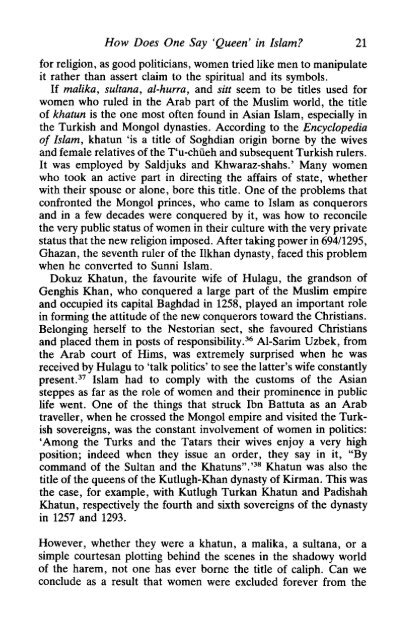Fatima.Mernessi_The-Forgotten-Queens-of-Islam-EN
Fatima.Mernessi_The-Forgotten-Queens-of-Islam-EN
Fatima.Mernessi_The-Forgotten-Queens-of-Islam-EN
You also want an ePaper? Increase the reach of your titles
YUMPU automatically turns print PDFs into web optimized ePapers that Google loves.
How Does One Say 'Queen' in <strong>Islam</strong>? 21<br />
for religion, as good politicians, women tried like men to manipulate<br />
it rather than assert claim to the spiritual and its symbols.<br />
If malika, sultana, al-hurra, and sitt seem to be titles used for<br />
women who ruled in the Arab part <strong>of</strong> the Muslim world, the title<br />
<strong>of</strong> khatun is the one most <strong>of</strong>ten found in Asian <strong>Islam</strong>, especially in<br />
the Turkish and Mongol dynasties. According to the Encyclopedia<br />
<strong>of</strong> <strong>Islam</strong>, khatun 'is a title <strong>of</strong> Soghdian origin borne by the wives<br />
and female relatives <strong>of</strong> the T'u-chueh and subsequent Turkish rulers.<br />
It was employed by Saldjuks and Khwaraz-shahs.' Many women<br />
who took an active part in directing the affairs <strong>of</strong> state, whether<br />
with their spouse or alone, bore this title. One <strong>of</strong> the problems that<br />
confronted the Mongol princes, who came to <strong>Islam</strong> as conquerors<br />
and in a few decades were conquered by it, was how to reconcile<br />
the very public status <strong>of</strong> women in their culture with the very private<br />
status that the new religion imposed. After taking power in 694/1295,<br />
Ghazan, the seventh ruler <strong>of</strong> the Ilkhan dynasty, faced this problem<br />
when he converted to Sunni <strong>Islam</strong>.<br />
Dokuz Khatun, the favourite wife <strong>of</strong> Hulagu, the grandson <strong>of</strong><br />
Genghis Khan, who conquered a large part <strong>of</strong> the Muslim empire<br />
and occupied its capital Baghdad in 1258, played an important role<br />
in forming the attitude <strong>of</strong> the new conquerors toward the Christians.<br />
Belonging herself to the Nestorian sect, she favoured Christians<br />
and placed them in posts <strong>of</strong> responsibility. 36 Al-Sarim Uzbek, from<br />
the Arab court <strong>of</strong> Hims, was extremely surprised when he was<br />
received by Hulagu to 'talk polities' to see the latter's wife constantly<br />
present. 37 <strong>Islam</strong> had to comply with the customs <strong>of</strong> the Asian<br />
steppes as far as the role <strong>of</strong> women and their prominence in public<br />
life went. One <strong>of</strong> the things that struck Ibn Battuta as an Arab<br />
traveller, when he crossed the Mongol empire and visited the Turkish<br />
sovereigns, was the constant involvement <strong>of</strong> women in politics:<br />
'Among the Turks and the Tatars their wives enjoy a very high<br />
position; indeed when they issue an order, they say in it, "By<br />
command <strong>of</strong> the Sultan and the Khatuns".' 38 Khatun was also the<br />
title <strong>of</strong> the queens <strong>of</strong> the Kutlugh-Khan dynasty <strong>of</strong> Kirman. This was<br />
the case, for example, with Kutlugh Turkan Khatun and Padishah<br />
Khatun, respectively the fourth and sixth sovereigns <strong>of</strong> the dynasty<br />
in 1257 and 1293.<br />
However, whether they were a khatun, a malika, a sultana, or a<br />
simple courtesan plotting behind the scenes in the shadowy world<br />
<strong>of</strong> the harem, not one has ever borne the title <strong>of</strong> caliph. Can we<br />
conclude as a result that women were excluded forever from the


